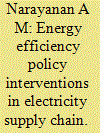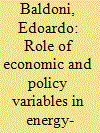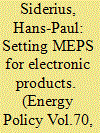|
|
|
Sort Order |
|
|
|
Items / Page
|
|
|
|
|
|
|
| Srl | Item |
| 1 |
ID:
150024


|
|
|
|
|
| Summary/Abstract |
This study uses bottom-up modeling framework in order to quantify potential energy savings and emission reduction impacts from the implementation of energy efficiency programs in the building sector in China. Policies considered include (1) accelerated building codes in residential and commercial buildings, (2) increased penetration of district heat metering and controls, (3) district heating efficiency improvement, (4) building energy efficiency labeling programs and (5) retrofits of existing commercial buildings.
|
|
|
|
|
|
|
|
|
|
|
|
|
|
|
|
| 2 |
ID:
128728


|
|
|
| 3 |
ID:
191295


|
|
|
|
|
| Summary/Abstract |
Energy Performance Certificates (EPCs) are designed to provide consistent and comparable energy efficiency ratings. Since 2008, any building constructed, rented or sold is required to obtain an EPC in the UK. 4% of simple office buildings have renewed their EPC to date in England and Wales. In this paper, by comparing the original and renewed EPCs of these buildings, we examine the reliability of non-domestic EPC ratings and discover realistic energy efficiency improvement strategies reflected in the changes. We have found that buildings with their conditions remaining unchanged can be better rated by approximately 10 points on average when their initial rating is above the minimum requirement in the regulation. The ones initially rated below the minimum requirement are expected to have a greater scale of improvement on ratings while making no efforts which brings doubts on the effect of the “Minimum Energy Efficiency Standard” policy. Evidenced human factors are also jeopardising the fairness of EPC ratings. Based on the changes in the EPCs, we have found 4 clusters of improved buildings and 5 clusters of deteriorated buildings. We derived practical energy efficiency improvement strategies that people have already naturally adopted.
|
|
|
|
|
|
|
|
|
|
|
|
|
|
|
|
| 4 |
ID:
115664


|
|
|
|
|
| Publication |
2012.
|
| Summary/Abstract |
This paper looks at Energy Savings Obligations in the UK. More specifically, it discusses how the policy instrument changed over time and what the drivers of that change were. The UK was the first country in Europe that introduced obligations on suppliers to save energy at the customer end in 1994. Since then this policy changed rapidly and is now the principal instrument to deliver energy savings in the housing stock. The paper aims to answer three questions: First, how did the policy instrument change over time? Second, what were the key drivers of that change? Third, how did those pressures filter through the policy process and affect the energy savings obligations?
|
|
|
|
|
|
|
|
|
|
|
|
|
|
|
|
| 5 |
ID:
125802


|
|
|
|
|
| Publication |
2013.
|
| Summary/Abstract |
In this paper we study an advertising campaign launched by the Irish government to induce more energy-efficient behaviour and we assess its effect on residential natural gas consumption. We first analyse changes in the daily consumption of natural gas and find that advertising leaflets had a significant, but short-lived, effect on natural gas consumption. We find no persistent effect of the campaign. We then study three surveys administered to 1000 consumers prior to and during the campaign. This repeated cross-section allows us to determine that the efficiency campaign has increased awareness of behaviours that curb natural gas consumption. However we do not find any significant effect of the campaign on self-reported natural gas-saving behaviour.
|
|
|
|
|
|
|
|
|
|
|
|
|
|
|
|
| 6 |
ID:
124504


|
|
|
|
|
| Publication |
2013.
|
| Summary/Abstract |
The European electricity market is linked to a carbon market with a fixed cap that limits greenhouse gas emissions. At the same time, a number of energy efficiency policy instruments in the EU aim at reducing the electricity consumption. This article explores the interactions between the EU's carbon market on the one hand and instruments specifically targeted towards energy end-use efficiency on the other hand. Our theoretical analysis shows how electricity demand reduction triggered by energy efficiency policy instruments affects the emission trading scheme. Without adjustments of the fixed cap, decreasing electricity demand (relative to business-as-usual) reduces the carbon price without reducing total emissions. With lower carbon prices, costly low emission processes will be substituted by cheaper high emitting processes. Possible electricity and carbon price effects of electricity demand reduction scenarios under various carbon caps are quantified with a long-term electricity market simulation model. The results show that electricity efficiency policies allow for a significant reduction of the carbon cap. Compared to the 2005 emission level, 30% emission reductions can be achieved by 2020 within the emission trading scheme with similar or even lower costs for the industrial sector than were expected when the cap was initially set for a 21% emission reduction.
|
|
|
|
|
|
|
|
|
|
|
|
|
|
|
|
| 7 |
ID:
166555


|
|
|
|
|
| Summary/Abstract |
Energy saving is a major policy objective worldwide and in the EU in particular. Evaluating the convenience of energy-efficient investments, however, is complex. This paper aims to apply stochastic Life Cycle Costing to assess the economic value of energy-efficient building retrofitting investments. The proposed approach investigates how macroeconomic variables affect such an evaluation by explicitly taking into account their interdependent stochastic nature. Consequently, the economic evaluation of an investment is itself stochastic thus expressing both its expected value and its inherent uncertainty and risk. On this basis, an illustrative case-study is presented, where alternative designs of the energy-saving intervention are compared and a sensitivity analysis performed to identify the determinants of the LCC outcome and of its variability. In terms of policy implications, a tool providing a sounder evaluation of the convenience of such investments can suggest when and to what extent incentives may be appropriate to facilitate these investments and what possible financial instruments could be put forward in order to reduce the associated risk.
|
|
|
|
|
|
|
|
|
|
|
|
|
|
|
|
| 8 |
ID:
179726


|
|
|
|
|
| Summary/Abstract |
Energy efficiency is considered to be one of the most reliable ways of addressing some of the most pressing global challenges, such as energy independence and the fight against the negative effects of climate change. It is widely recognised that the EU path towards decarbonisation has to be accompanied by energy efficiency improvements. Focusing on the EU28 from the year 2000 onwards, this analysis aims at identifying the main driving factors behind the energy consumption changes at the global and sectoral level. Concretely, our focus on the productive sectors (responsible for 41% of total consumption) is due to the importance that these sectors have in reaching the overall EU targets.
|
|
|
|
|
|
|
|
|
|
|
|
|
|
|
|
| 9 |
ID:
132741


|
|
|
|
|
| Publication |
2014.
|
| Summary/Abstract |
When analysing price, performance and efficiency data for 15 consumer electronic and information and communication technology products, we found that in general price did not relate to the efficiency of the product. Prices of electronic products with comparable performance decreased over time. For products where the data allowed fitting the relationship, we found an exponential decrease in price with an average time constant of ?0.30 [1/year], meaning that every year the product became 26% cheaper on average.
The results imply that the classical approach of setting minimum efficiency performance standards (MEPS) by means of life cycle cost calculations cannot be applied to electronic products. Therefore, an alternative approach based on the improvement of efficiency over time and the variation in efficiency of products on the market, is presented. The concept of a policy action window can provide guidance for the decision on whether setting MEPS for a certain product is appropriate. If the (formal) procedure for setting MEPS takes longer than the policy action window, this means that the efficiency improvement will also be achieved without setting MEPS. We found short, i.e. less than three years, policy action windows for graphic cards, network attached storage products, network switches and televisions.
|
|
|
|
|
|
|
|
|
|
|
|
|
|
|
|
| 10 |
ID:
132742


|
|
|
|
|
| Publication |
2014.
|
| Summary/Abstract |
Turkey's energy demand has been growing by 4.5% per year over the last decade. As a reaction to this, the Turkish government has implemented the Strategic Energy Efficiency Plan (SEEP), which provides a guideline for energy efficiency policies in all sectors.
The aim of this study is to analyse the potential of the SEEP on final energy demand in the Turkish residential sector until 2030. Three scenarios are developed based on a detailed bottom-up modelling approach using a vintage stock model to simulate the energy demand of heating systems and appliances.
The results show a decreasing final energy demand in the reference scenario from about 944 PJ in 2008 to 843 PJ in 2030. This reflects a structural break, which is mainly caused by a high building demolition rate and low efficiency in the existing building stock. The SEEP achieves additional savings of around 111 PJ until 2030, while a scenario with even higher efficiency shows further savings of 91 PJ. Electricity demand increases in all scenarios - mainly due to growing ownership rates of appliances. The SEEP will achieve around 10 TWh of electricity savings in 2030 compared to the reference scenario, mainly through more ambitious end-use standards.
|
|
|
|
|
|
|
|
|
|
|
|
|
|
|
|
|
|
|
|
|